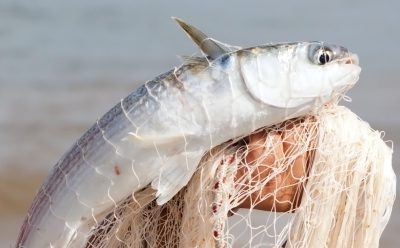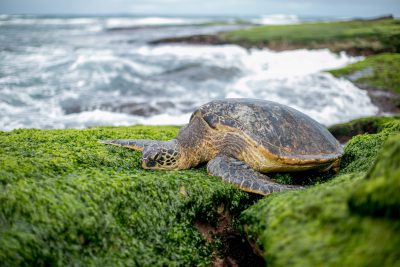Many people who have given up meat from land animals still eat fish. Why is this?
Well, there are a number of reasons.
Eating Fish Is Not Healthy
Fish contain omega 3 fatty acids, which is why some people think we need to eat them, but research shows that vegan sources of omega 3 have the same health benefits. When we eat walnuts, flax, and chia seeds we get all the goodness we need without all the dangerous elements of eating fish. Fish contains saturated fat and cholesterol, as well as several toxins including polychlorinated biphenyls (PCBs), dioxins, and mercury.
Fish Are Sentient Beings
It can be hard for us to imagine what a fish’s internal experience or perception might be like because they are so different from us. They live in another element, speak a language we cannot hear or understand, and we struggle to read their behaviour in the way we do with our wagging dogs and purring cats. Fish may not cluck, bleat, or squeal in terror the way a chicken, sheep, or pig headed for slaughter might. But they do suffer, and they do express their suffering. It’s just most of us do not know how to recognize the signs and, if we’re honest, perhaps we don’t really try to.
Fish Deserve Our Compassion
In response to substantial evidence gathered, fish biologists around the world now accept that fish do feel conscious pain, just like mammals and birds do.
As with cats and dogs, we may never discover whether or not fish feel pain in exactly the same way we do, and yet there are parts of ourselves that we can recognize in fish—spines, pain receptors, endorphins, and all of the familiar pain reflexes—and these are the similarities that matter. Fish have the ability to feel pleasure and the ability to suffer, and so they ultimately deserve our compassion.
In his bestselling book Eating Animals, Jonathan Safran Foer asks some very important questions about the morality of eating fish.
“Is the suffering of a drawn-out death something that is cruel to inflict on any animal that can experience it, or just some animals? Just how distant are fish from us in the scheme of life? Is it a chasm or a tree that defines the distance? If we were to one day encounter a form of life more powerful and intelligent than our own and it regarded us as we regard fish, what would our argument be against being eaten? The lives of billions of animals a year and the health of the largest ecosystem on our planet [our oceans] hang on the thinly reasoned answers we give to these questions.”
And this brings me to another very important reason why we should eliminate fish and shellfish from our diets.
Fishing Is Killing Our Oceans
Kendall Jones, a research scientist at the Wildlife Conservation Society, has stated that fishing, as well as run-off waste and chemicals from industrial farms, are the two most significant ways in which humans are negatively impacting ocean ecosystems. These harmful activities coupled with the influx of plastic pollution, 46 percent of which comes from fishing nets, are devastating oceanic life. As a result, just 13 percent of the world’s oceans remain untouched by the damaging impacts of humanity.
The situation is very serious, and it’s not somebody else’s responsibility to deal with it.
It’s ours.
How To Save Our Oceans
Those who supply our demand for fish haul up to 2,700 trillion animals from the ocean each year by means that are incredibly damaging to all forms of ocean life.
Almost all of the wild-caught fish we eat today comes to us by way of longlining, beam or bottom trawling. Whilst subjecting fish to a slow and distressing death, usually by suffocation, the indiscriminate nature of these modern fishing techniques means that hundreds of other species are also inevitably killed in the process.
Today, for every 10 tuna, sharks, and other large predatory fish that were in our oceans 50 to 100 years ago, only one is left and that’s because we eat fish. If we continue, scientists predict that every species of wild fish—from tuna to sardines—will collapse by the year 2050.
In short, we are literally eating away at our oceans.
Doing The Right Thing
Don’t let your compassion for others and environmental concerns end where your appetite begins. You can help to conserve our ocean ecosystems and reduce suffering by eliminating fish from your diet.
Ocean expert Captain Paul Watson, the founder of the Sea Shepherd Conservation Society and proud supporter of Million Dollar Vegan, states:
“The ocean needs action, not talk. People need to stop eating fish… to be educated that our very survival as a species depends 100 percent on a healthy ocean and that when the ocean dies, we all die – every single one of us.”
It’s Time To Act
Go vegan today, for the sake of fish and our oceans. Our free Vegan Starter Kit will help you help fish and protect our oceans.



